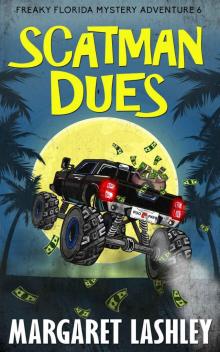- Home
- Margaret Lashley
What She Forgot Page 5
What She Forgot Read online
Page 5
Deanna adored that photo. But it wasn’t her favorite of the three. She sighed and chewed her bottom lip. As her heels clicked along the terrazzo floor of the airport terminal, a second image swept across Deanna’s mind.
A photo of her parents on a yacht.
Against a backdrop of blue sky, Warren wore dark sunglasses and a crisp, long-sleeved, cotton shirt. The gold watch on his wrist glinted almost as brightly as the sun. To Warren’s left, the hand of an otherwise unseen crewmember held up a huge marlin her father surely must’ve caught himself. Why else would he have looked so tired? His right arm was wrapped around Melody. Her head was back slightly, caught in the middle of a laugh. She wore a pink bikini the same shade as her lipstick. Her hair was tousled by the wind, and her hourglass figure was perfect in that sexy, voluptuous way that disappeared from fashion along with Marilyn Monroe.
A third photo showed Warren propped up on pillows, doing his best to look handsome despite having grown considerably thinner. His skin was gray. His eyes rimmed with red. Still, he was smiling, looking down at the pink bundle in his arms—newborn baby Deanna. It was the closest thing to a family photo Deanna had, even though Melody wasn’t in it. And for some reason, it was Deanna’s favorite.
“Ma’am?”
Deanna blinked and was somewhat surprised to find she was at the airport car rental kiosk. It was her turn at bat.
“Yes, sorry,” Deanna fumbled.
“Dreaming of your Florida vacation?” the woman at the counter teased. Her smile appeared almost genuine.
“Yes. Something like that. I have a reservation.”
Deanna fumbled through her purse and handed the woman her credit card and driver’s license, along with her reservation slip.
“New York City,” the woman read. “Long way from home.”
“Yes.”
“Would you like a map of the Tampa Bay area?”
“No, thanks. I’ve been here before.”
“Okay.” The woman handed her a set of keys. “Looks like you’re good to go.”
Am I? Deanna thought. I guess we’ll have to wait and see about that.
Chapter Seven
“ANY PLANS FOR THIS beautiful Sunday afternoon?” Deloris Blatch asked her son as he came through the front door of her Craftsman-style bungalow.
“I thought we’d make a Greek salad and watch that movie you like so much. The Notebook?” He followed her into the kitchen carrying a brown paper bag stuffed with groceries.
“You don’t have to waste your day with me,” Deloris teased. “Wouldn’t you rather be out with your friends?”
“No.” Marcus kissed his mother’s cheek. “I thought I’d stick close to home today.”
Deloris eyed her son with a mixture of mirth and suspicion. “You’re worried about me, aren’t you?”
Marcus returned her dimpled grin. “To be honest, yes.”
She pursed her lips. “I’m fine. My blood pressure is totally under control now. Besides, you should be worried about yourself. It’s got to be stressful starting a new career. Especially at your age.”
Blatch shrugged. “Private detective work isn’t that different from being a cop.” He shot his mother a look. “And I’m not that old,” he said, trying to convince himself more than his mother. “Careful or I’ll tell you that you look beautiful ... for your age.”
Deloris grinned. “Sorry. You’re right. It’s just that back in my day, people stuck with a job for life, like your father did. It didn’t matter how miserable they were.”
Blatch smirked. “I’m supposed to admire self-flagellation? Besides, you know I didn’t leave the police force because I was miserable.”
She pulled a chopping board from atop the refrigerator. “I know. I’m proud of you for standing up for your principles.”
Marcus pulled a cucumber and a red bell pepper from the grocery bag. “Too bad principles aren’t edible.”
The delicate skin above Deloris’ silver eyebrows crinkled. “Are you broke, Marcus? Do you need money?”
“No, Mom. It was a joke.”
Deloris let loose a tinkling laugh. “Okay. Let me know if I can help. So, Greek salad and The Notebook. I’m game. But don’t complain later that I didn’t give you an out.”
Marcus toyed with the pepper, twirling it around by its stem as he chewed his bottom lip. “Mom, I don’t need an out. In fact ... I’m thinking of moving back here with you. What do you think about that?”
Deloris studied her son. Where was that headstrong confidence of his? “Why would you want to do that? You are broke, aren’t you?”
“No!” Marcus said. “I ... I’ve got some savings. I just thought, well, I could economize until business picks up. And I’ll be here to prot—uh ... provide help. In case you need me.”
Marcus Blatch wasn’t good at lying, and he’d just told his mother two. Or, more accurately, he’d told her two half-truths. His bankbook was dwindling faster than he’d anticipated. Rent for the posh office downtown and his partner Smalls’ insistence on hiring an assistant were more than he’d bargained for. But, like Smalls had said, if they didn’t look successful, they couldn’t be successful.
The other half-truth involved a map Marcus kept hidden from his mother. It was a diagram of her neighborhood he’d made while he was still on the force.
For the last two years, during his arduous stint as a police lieutenant, he’d kept a careful eye on crimes reported within a mile radius of her house. Being a tourist town, St. Petersburg had more than its fair share of sketchy transients and dodgy opportunists. The police hotline had never stopped ringing.
But the bullseye on Marcus’ map was his mother’s house.
The orange circle surrounding her house on Cherry Street in the Old Northeast neighborhood was pockmarked with blue dots, indicating domestic disturbances and petty thefts. Two black dots represented homicides. Three red ones were unsolved missing-persons reports.
Three days ago, a former colleague on the force had informed him a fourth person had gone missing from the neighborhood. A postman. It could be nothing. A disgruntled, fed-up employee quitting without notice. Or it could be something. Another victim of an as yet unknown and unnamed serial killer on the prowl.
With precious little evidence to go on, the St. Petersburg Police Department, SPPD, remained stumped by the cases. It was as if the people had just vanished. Blatch didn’t want his mother to be the fifth name on that list. For him, moving in with her made sense. He would sleep better knowing she was safe.
“Son, I’d love the company,” Deloris said as she tore chunks from a head of romaine lettuce and tossed them into a salad bowl. “But I don’t need you to take care of me. Not yet, anyway. And wouldn’t living with me kind of cramp your style?”
Marcus grinned. “I have a sneaking suspicion it may be the other way around. You’re the one always out with friends. Have you got a boyfriend you’re not telling me about?”
“That’s an absurd question.” She winked. “If I had a boyfriend I wasn’t telling you about, I wouldn’t tell you about him.”
Marcus laughed and chopped the red pepper. “I don’t want to move in because I think you’re a doddering old woman, Mom.”
Deloris shoved the salad bowl across the counter toward him. “Then why?”
“Because I’m worried I may have made a mistake. If we don’t get some clients soon, I may become a bottom feeder. I might even sink as low as to get my real estate license.”
Deloris aped a horrified look. “Things can’t be that bad!” She laughed. “You just need a few clients under your belt, son, and word of your genius will spread far and wide across the land.”
Marcus smiled and tossed the chopped pepper into the salad bowl. “Thanks for always being my cheerleader, Mom.”
She handed him a bunch of green onions. “So when will you be moving in?”
Marcus winced. “My lease is up at the end of the month.”
Deloris pouted. “That’s in what? A wee
k?”
“Yeah. Too soon?”
“No. That’s a whole week I have to wait.”
Marcus blinked against the sudden stinging in his eyes. It wasn’t the onions. His vision blurred with grateful tears as he glanced over at the spunky, graceful woman who’d saved his life. Deloris and her husband Dave had adopted him when he was thirteen—an age when he’d been written off as too old. Expired goods.
Against all odds, Deloris and Dave Blatch had given him a reprieve from foster care—another lease on life. Like an old hound saved from a kill shelter, Marcus’ life had taken a one-way turn for the better. He’d come to live at their home as their son—one hundred percent.
No one had mentioned the adoption again until Marcus was eighteen. The day after he graduated from high school, they’d sat him down and told him the adoption documents were in a safe deposit box at the bank if he ever wanted to see them. They’d given him a key to the box, and to a second-hand car, his graduation gift.
Marcus had never used the bank key. He’d never seen the point. Dave and Deloris had chosen him because they wanted him. They’d been his parents through and through. To him, the old saying about blood being thicker than water was bullshit. What good was blood without love?
When Dave passed away five years ago, Deloris had handed her son the keys to everything else, along with the deed to their house. She trusted him completely. Loved him completely. And he loved her. Trusted her. Wanted to protect her with his life.
A tear of gratitude rolled down his cheek as he chopped the onions. He hated to think what kind of life he’d have had if it weren’t for her.
“Tea?” she asked.
Marcus nodded and pulled a bottle of olives from the shopping bag. As he watched his mother’s delicate, liver-spotted hand shake slightly as she poured tea into two glasses filled with ice, his heart swelled. Deloris Blatch’s only flaw was that she was too loving. And, perhaps, too trusting. Despite denying it, she was getting frail. She didn’t need to be living alone. Not with everything that was going on in the neighborhood.
“Mom, if it’s okay with you, I’ll stay the night.”
Deloris turned and handed her son a glass of iced tea. “Marcus. This is your home. You don’t need to ask.”
Chapter Eight
THE CARRY-ON WHEEL squealed painfully as Deanna tugged her luggage along the oil-stained concrete of the underground garage toward a line of rental cars. She clicked the key fob. A seafoam green Prius beeped and winked its lights at her.
She noticed it was in parking spot fifteen.
Fifteen was not Deanna’s lucky number.
As she stuck her baggage in the trunk, Deanna thought about the final trip her dead mother had just taken and cringed. A shut-in due to her debilitating agoraphobia, Melody must’ve hated being dragged from her home ... loaded onto an ambulance by strangers ... dumped off at the morgue like a side of beef ....
The utter indignity of dying made Deanna shudder, and she hoped that her mother hadn’t take her phobias with her.
Deanna recalled the first time she’d recognized the signs of her mother’s growing social phobia. She’d read about the symptoms in a high-school psychology textbook: excessive self-consciousness, fear of public scrutiny, and fear of being rejected or evaluated negatively by others.
Every year, her mother’s phobias had worsened, making her increasingly dependent upon Deanna to run errands, fetch the newspaper and mail, and keep the house and yard tidy. During Deanna’s high-school years, Melody’s world had shrunk even further, until it encompassed only the house and backyard. Visitors inside the house were banned—including Deanna’s school friends. According to her mother, the girls had only pretended to be Deanna’s friends, anyway. What they were really after was a picture and autograph from her, movie star Melody Young.
By the time Deanna began commuting to Tampa for classes at the University of South Florida, she’d become her mother’s cook, errand girl, maid, and occasionally, during drunken lamentations, Melody’s confidant. Deanna had borne the burden mostly with resigned silence. She’d kept her eye on the prize—an education. A degree would give her freedom, an option beyond her forced dependence on a capricious, neurotic mother who held the purse strings, and thus, power over her.
Despite the hardship, Deanna had seen no point in complaining. Who would have listened? Warren was dead. And there’d been no one else to help out. The only relative she’d known of—her mother’s sister, Emma—considered Deanna and her mother trash. Melody had told Deanna so. Because her mother had been pregnant with her before she married Warren, in the eyes of her self-righteous Southern Baptist sister, Melody was a whore, and, by default, Deanna was a bastard.
Every year, Melody had grown increasingly paranoid. She’d become convinced the neighbors were spies and busybodies, jealous of their big house and her movie-star career. Deanna had been given strict orders not to speak to any of them. The only exceptions had been their nextdoor neighbors, Mrs. Havenall and her daughter, Jodie. Even then, her mother had spied on them through the windows, certain she would prove they were up to no good.
Twenty years of hindsight and a master’s in psychology had helped Deanna understand her mother’s actions had been motivated by her own phobic fears, insecurities, and crushing self-doubts. Even so, the imprints they’d stamped on Deanna’s malleable childhood psyche were hard to shake—stowaways popping up at the worst possible times—often still wielding enough power to bring tears to her eyes ....
Deanna wiped her cheek and steered the Prius through the airport exit. As she reached the on-ramp to I-275 South, a red SUV honked at her. She slowed down to let it cut in ahead, but it zoomed past. In the passenger seat, an old lady waved. It was the woman who’d been her seatmate on the flight. Deanna mustered a smile and waved back.
Thank heaven for nice folks like that old lady, Deanna thought as she caught her first glimpse of the churning waters of Tampa Bay. Without them, I’d most certainly have drowned.
SUNDAY TRAFFIC ON THE interstate was light. Within a few minutes, Deanna was already on the approach to the Howard Frankland Bridge, the three-mile span linking Tampa to St. Petersburg across Tampa Bay.
Deanna felt her stomach knot.
As she steered onto the bridge, Deanna’s thoughts went to poor Mrs. Mendel, her patient who suffered from gephyrophobia—fear of bridges. Deanna pictured Mrs. Mendel in the passenger seat next to her, trembling, panting, palms sweating, her eyes squeezed shut, crushed by an irrational fear she felt powerless to control ....
The knot in Deanna’s stomach tightened. She knew all too well Mrs. Mendel’s struggle was real, because her own had just begun—as it always did. Deanna’s palms began to sweat. Her hands trembled on the wheel.
She was afraid of bridges, too.
But only this one.
For Deanna, the Howard Frankland Bridge wasn’t merely a construct of concrete and rebar that spanned Tampa Bay. It was the crossover to memories—memories she could pretend weren’t real until the landmines lying in wait ahead would erase the hope they’d been figments of her imagination.
Deanna clenched her teeth and tightened her grip on the steering wheel as she approached the first landmine—the massive, 75-foot high pillar welcoming passersby to the city of St. Petersburg. It jutted from the ground like a giant, orange-and-blue finger, wagging at her. Shame on you for not being happy to be home, Deanna. What’s wrong with you?
Deanna kept her eyes on the road as she passed the sign. Taillights blinking on and off in the lanes ahead told her traffic on I-275 was beginning to back up. She decided to exit onto 4th Street.
She tapped the brakes on the Prius and shifted over one lane to the right. A car horn honked. Deanna glanced in the side mirror. A dark blue car swerved into her lane two cars back. Apparently, the honk wasn’t for her.
Not everything’s your fault, Deanna reminded herself. She rolled her tight shoulders and took a deep breath. You can do this.
She steppe
d on the gas and headed south along 4th Street, oblivious to the dark blue sedan tailing fifty yards behind her. At the corner of 38th Avenue, she spotted the cheerful, pink-and-white sign for Lynette’s Corner Bakery. Deanna winced and braced for impact as she collided headlong into another memory—one that had changed her life forever.
The day she’d turned fifteen.
Chapter Nine
THE DARK SEDAN TURNED sharply, almost sideswiping a Jeep as it changed lanes to take the 4th Street exit off the Howard Frankland Bridge. The driver snickered.
Thought you could lose me, hey Deanna?
No worries.
I know where you live.
Chapter Ten
DEANNA TOOK A DEEP breath and loosened her vice-grip on the steering wheel of the rented Prius. She couldn’t shake the odd feeling that she was hurtling toward her own doom—that the funeral she was heading to wasn’t her mother’s, but her own.
The feeling shocked Deanna. Where had it come from? She’d spent decades analyzing her mother’s behaviors and how they’d shaped her into the woman she was today. Now, where once she’d felt victimized, Deanna saw the gifts that had come along with her early struggles. She was independent. Self-reliant. Determined. Disciplined. And, with the exception of Bernstein, a pretty good read of human behavior.
But for some reason, as she drove toward her mother’s funeral, she felt vulnerable. Would her new, carefully reconstructed self be able to withstand her dead mother’s scrutiny, or would her ghost topple Deanna like a pile of poorly laid children’s building blocks?
Have I freed myself from my mother’s grasp, or have I just found a prettier cage in New York? she wondered, painfully aware of the many psychic scars still remaining.
At 37, Deanna had developed only a few relationships, and had never married. Trust was a problem for her. So was intimacy. Even now, she was so fearful of commitment that her only companions were six fish in a small aquarium in her apartment.

 Val Fremden Mystery Box Set 1
Val Fremden Mystery Box Set 1 Lunatic's Game
Lunatic's Game Val Fremden Mystery Box Set 3
Val Fremden Mystery Box Set 3 1 Glad One - Crazy is a Relative Term
1 Glad One - Crazy is a Relative Term What She Forgot
What She Forgot Scatman Dues (Freaky Florida Mystery Adventures Book 6)
Scatman Dues (Freaky Florida Mystery Adventures Book 6) 0.5 Absolute Zero - Misadventures From A Broad
0.5 Absolute Zero - Misadventures From A Broad Fifty is the New F-Word
Fifty is the New F-Word Freaky Florida Mystery Adventures Box Set
Freaky Florida Mystery Adventures Box Set Family Fruitcake Frenzy
Family Fruitcake Frenzy Doggone Disaster
Doggone Disaster Moth Busters, Dr. Prepper, Oral Robbers: Freaky Florida Mystery Adventures 1, 2 & 3
Moth Busters, Dr. Prepper, Oral Robbers: Freaky Florida Mystery Adventures 1, 2 & 3 Seven Daze
Seven Daze Two Crazy_Fickle Finger of Fate
Two Crazy_Fickle Finger of Fate Two Crazy: Fickle Finger of Fate (A Val Fremden Mystery Book 2)
Two Crazy: Fickle Finger of Fate (A Val Fremden Mystery Book 2) Absolute Zero_Misadventures From A Broad
Absolute Zero_Misadventures From A Broad Cloud Nine- When Pigs Fly
Cloud Nine- When Pigs Fly Three Dumb: Wheelin' & Dealin' (A Val & Pals Humorous Mystery Book 3)
Three Dumb: Wheelin' & Dealin' (A Val & Pals Humorous Mystery Book 3) Glad One: Starting Over is a %$#@&! (Val & Pals Book 2)
Glad One: Starting Over is a %$#@&! (Val & Pals Book 2) Absolute Zero: Misadventures From A Broad (Val & Pals Book 1)
Absolute Zero: Misadventures From A Broad (Val & Pals Book 1) Glad One_Crazy is a Relative Term
Glad One_Crazy is a Relative Term Seven Daze_Redneck Rendezvous
Seven Daze_Redneck Rendezvous Seven Daze: Redneck Rendezvous (A Val Fremden Mystery Book 7)
Seven Daze: Redneck Rendezvous (A Val Fremden Mystery Book 7) Val & Pals Boxed Set: Volumes 1,2 & the Prequel (Val & Pals Humorous Mystery Series)
Val & Pals Boxed Set: Volumes 1,2 & the Prequel (Val & Pals Humorous Mystery Series)